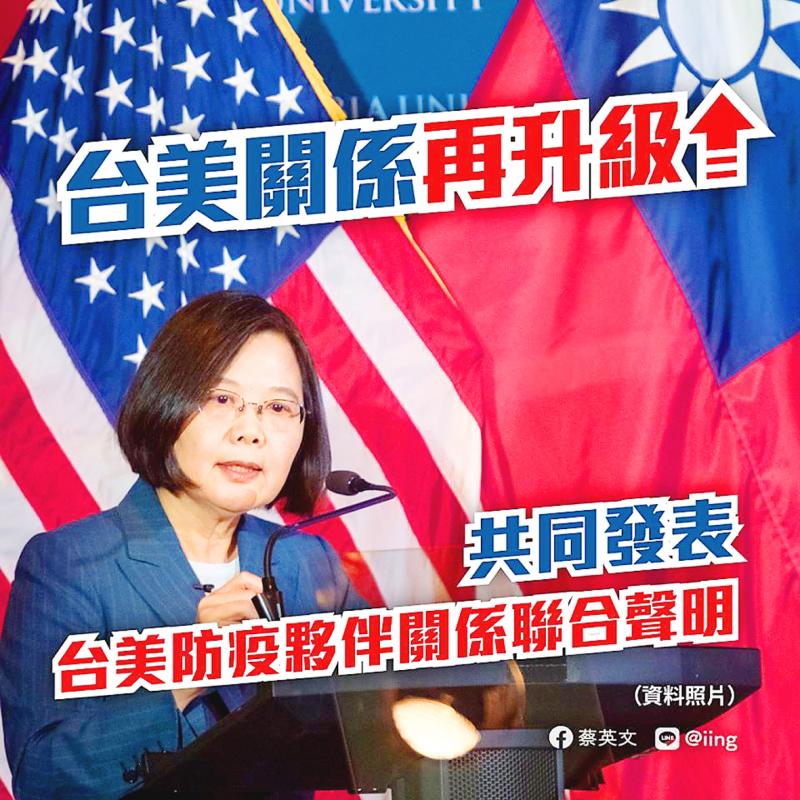Taiwan and the US are to combat the COVID-19 pandemic together, with the partnership including medicine development, contact tracing technology and the exchange of medical supplies, the American Institute in Taiwan (AIT) and the Ministry of Foreign Affairs said in a joint statement yesterday.
The statement, signed by AIT Director Brent Christensen and Minister of Foreign Affairs Joseph Wu (吳釗燮), said: “To further strengthen US-Taiwan consultation and cooperation on combating the COVID-19 virus, which originated in Wuhan, both sides will seek to share best practices and cooperate on a range of activities.”
Following the AIT’s statement on Sunday, which said that both sides would cooperate on developing vaccines and medicine to combat “the Wuhan coronavirus,” yesterday’s statement again highlighted the virus’ Chinese origin.

Screen grab from Tsai Ing-wen’s Facebook page
The statement also listed six areas of bilateral collaboration: research and development of rapid tests; research and development of vaccines; research and development of medicines; contact tracing techniques and technology; joint conferences with scientists and experts; and cooperation and exchanges of medical supplies and equipment.
The US has prepared for Taiwan the raw materials required to make 300,000 protective outfits, while Taiwan — when its mask supplies are stable — is to send 100,000 masks per week to the US, Wu told a news conference at the Central Epidemic Command Center (CECC).
Wu said the AIT has contacted Academia Sinica to discuss the prospect of working together.
Since late last month, Academia Sinica has announced several breakthroughs, such as developing antibodies for a rapid immune-based test kit and synthesizing the drug remdesivir, a potential candidate for treating the coronavirus.
The AIT yesterday posted a photograph on Facebook showing Christensen and Academia Sinica President James Liao (廖俊智) meeting on Tuesday, saying that they discussed the many ways in which the US and Taiwan could improve health cooperation.
“Academia Sinica’s achievements and expertise are impressive, including its development of an innovative new rapid test for COVID-19. The United States can benefit greatly from this partnership with the people of Taiwan,” the AIT wrote, adding the hashtags “RealFriendsRealProgress” and “StriveTogetherThriveTogether.”
Academia Sinica later yesterday also posted on Facebook a photograph of Liao meeting Christensen.
Academia Sinica wrote that last month, it convened its researchers and members from universities, other institutes and government bodies to form a platform to combat COVID-19, expressing the hope of maximizing research by working with the US and global partners.
Separately yesterday, European Economic and Trade Office Director Filip Grzegorzewski wrote on Twitter that “#EU and #Taiwan Academia Sinica [are] working together on the most advanced rapid tests and vaccines for #COVID. With 15-minutes reliable tests, we will defeat #coronavirus.”

AIR SUPPORT: The Ministry of National Defense thanked the US for the delivery, adding that it was an indicator of the White House’s commitment to the Taiwan Relations Act Deputy Minister of National Defense Po Horng-huei (柏鴻輝) and Representative to the US Alexander Yui on Friday attended a delivery ceremony for the first of Taiwan’s long-awaited 66 F-16C/D Block 70 jets at a Lockheed Martin Corp factory in Greenville, South Carolina. “We are so proud to be the global home of the F-16 and to support Taiwan’s air defense capabilities,” US Representative William Timmons wrote on X, alongside a photograph of Taiwanese and US officials at the event. The F-16C/D Block 70 jets Taiwan ordered have the same capabilities as aircraft that had been upgraded to F-16Vs. The batch of Lockheed Martin

GRIDLOCK: The National Fire Agency’s Special Search and Rescue team is on standby to travel to the countries to help out with the rescue effort A powerful earthquake rocked Myanmar and neighboring Thailand yesterday, killing at least three people in Bangkok and burying dozens when a high-rise building under construction collapsed. Footage shared on social media from Myanmar’s second-largest city showed widespread destruction, raising fears that many were trapped under the rubble or killed. The magnitude 7.7 earthquake, with an epicenter near Mandalay in Myanmar, struck at midday and was followed by a strong magnitude 6.4 aftershock. The extent of death, injury and destruction — especially in Myanmar, which is embroiled in a civil war and where information is tightly controlled at the best of times —

China's military today said it began joint army, navy and rocket force exercises around Taiwan to "serve as a stern warning and powerful deterrent against Taiwanese independence," calling President William Lai (賴清德) a "parasite." The exercises come after Lai called Beijing a "foreign hostile force" last month. More than 10 Chinese military ships approached close to Taiwan's 24 nautical mile (44.4km) contiguous zone this morning and Taiwan sent its own warships to respond, two senior Taiwanese officials said. Taiwan has not yet detected any live fire by the Chinese military so far, one of the officials said. The drills took place after US Secretary

THUGGISH BEHAVIOR: Encouraging people to report independence supporters is another intimidation tactic that threatens cross-strait peace, the state department said China setting up an online system for reporting “Taiwanese independence” advocates is an “irresponsible and reprehensible” act, a US government spokesperson said on Friday. “China’s call for private individuals to report on alleged ‘persecution or suppression’ by supposed ‘Taiwan independence henchmen and accomplices’ is irresponsible and reprehensible,” an unnamed US Department of State spokesperson told the Central News Agency in an e-mail. The move is part of Beijing’s “intimidation campaign” against Taiwan and its supporters, and is “threatening free speech around the world, destabilizing the Indo-Pacific region, and deliberately eroding the cross-strait status quo,” the spokesperson said. The Chinese Communist Party’s “threats